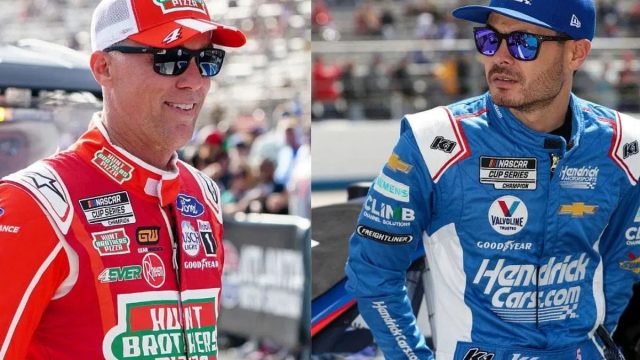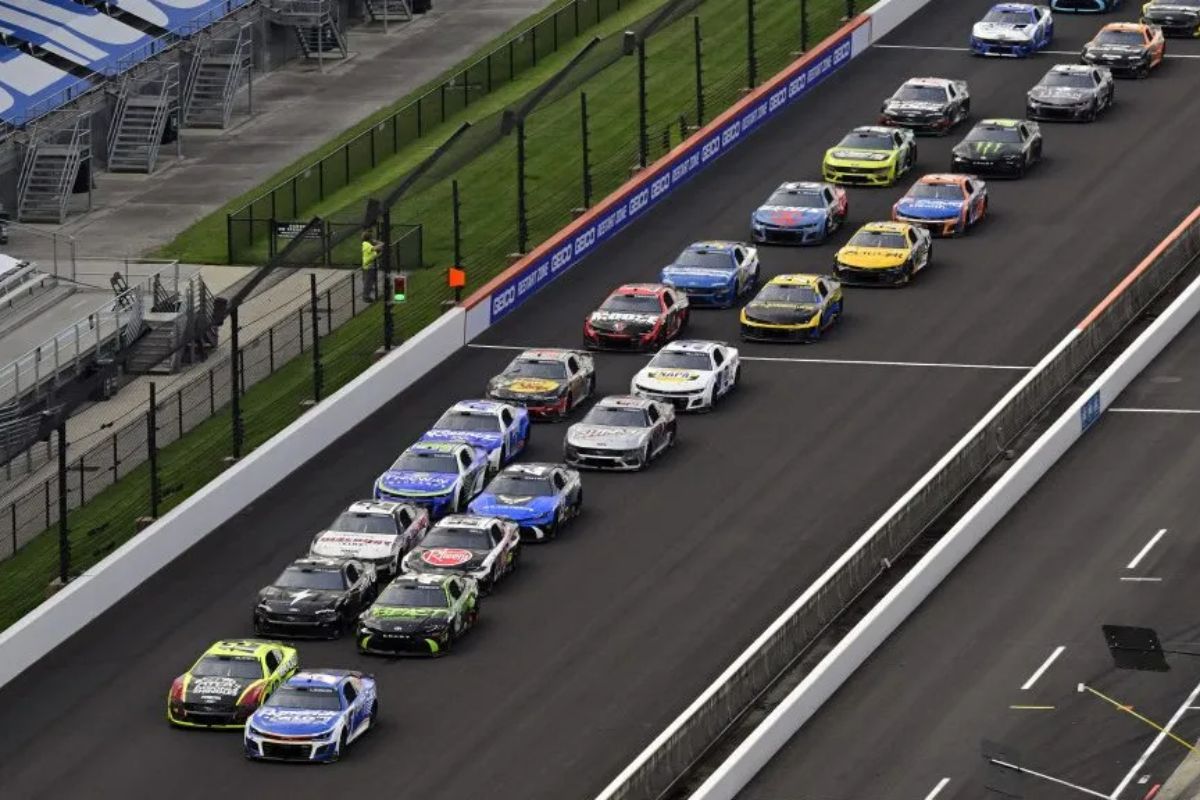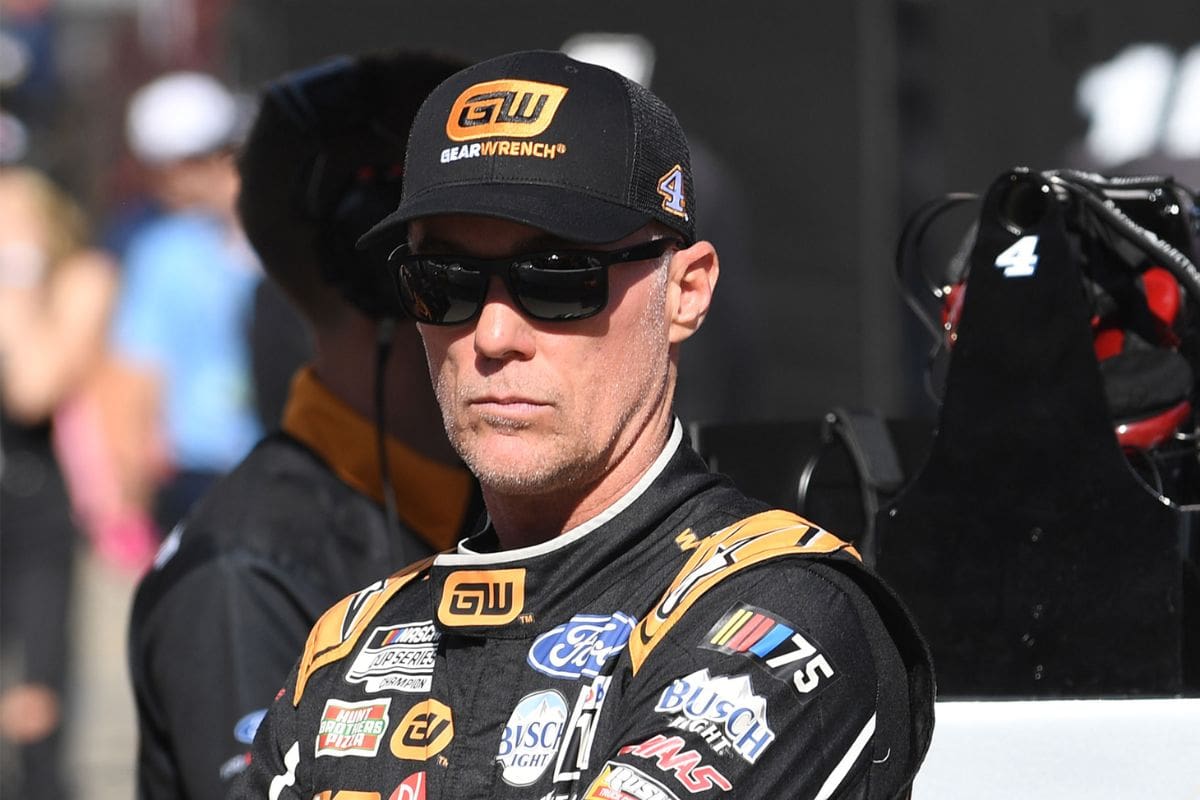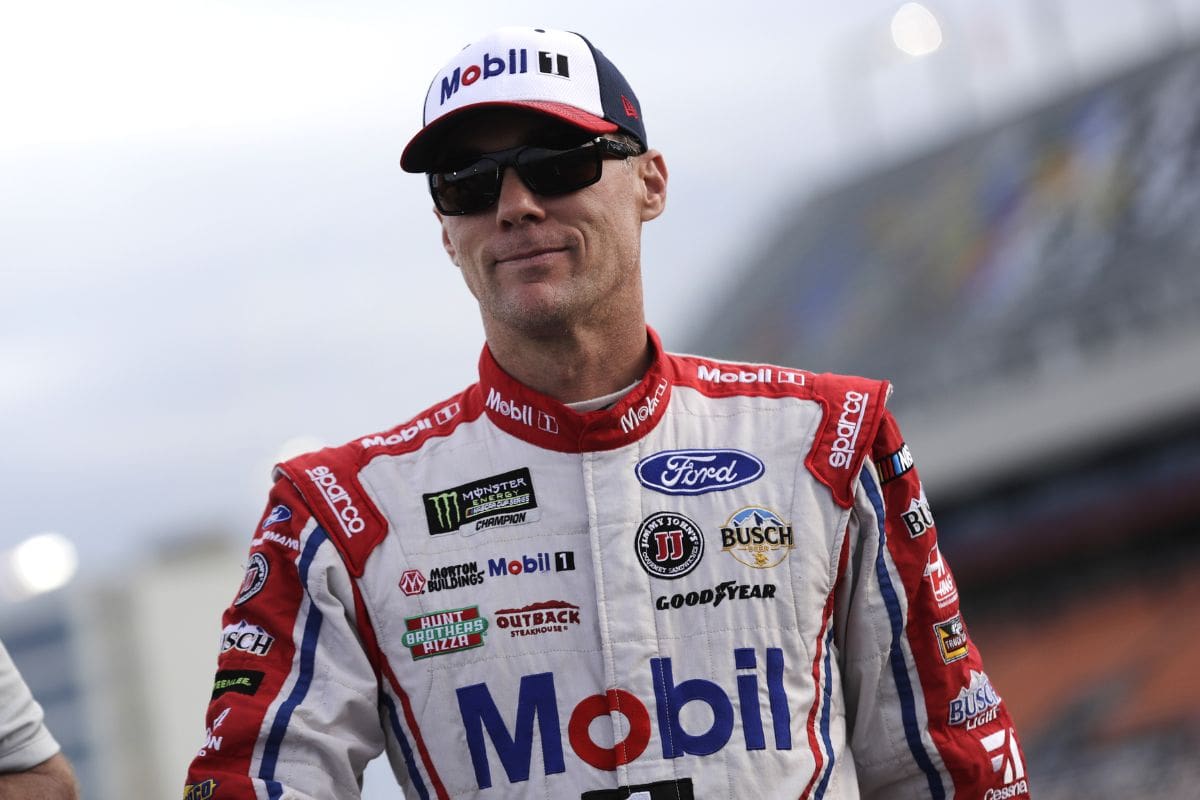Kevin Harvick Slams NASCAR for Indianapolis Caution Call: Kevin Harvick‘s recent critique of NASCAR’s handling of the caution call during Kyle Larson‘s Indianapolis win raises questions about the integrity of officiating in the sport. Harvick’s assertion that the yellow flag’s timing considerably altered the race outcome not only highlights his concerns about fairness but also points to a larger issue of transparency within NASCAR. As the conversation progresses, it becomes clear that the implications of these decisions extend beyond individual races, potentially affecting the trust between drivers, teams, and the governing body itself.
Key Highlights
- Kevin Harvick criticized NASCAR for its handling of the last-lap caution that affected the outcome of the race.
- Harvick expressed concerns about the integrity of officiating and the timing of caution flags during the race.
- He highlighted the necessity for improved communication between NASCAR officials and drivers to enhance decision-making transparency.
- Harvick reflected on Kyle Larson’s skill and strategy in driving the race, showing his talent amidst the controversy.
NASCAR’s Return to Indianapolis
NASCAR’s return to the Indianapolis Motor Speedway marked a notable moment in the series’ history, rekindling fan excitement and raising questions about competitive integrity amid dramatic race dynamics. After a three-year break, the series returned to this iconic venue with heightened expectations and a desire to reclaim its place in motorsports history.
The race started with Kyle Larson skillfully driving through the field, ultimately outsmarting Ryan Blaney for a well-deserved victory, intensifying the narrative surrounding driver performance and NASCAR’s officiating. The dynamics of the race emphasized the interplay between strategy, skill, and the unpredictable nature of stock car racing.
Larson’s success, however, was not without controversy. The last-lap caution call ignited a debate regarding NASCAR’s decision-making processes and the potential impact of officiating on race outcomes. While Blaney expressed dissatisfaction with the perceived favoritism towards Larson, the incident has led to a broader discussion about the clarity and consistency of NASCAR’s rules.
Kevin Harvick’s Criticism
Retired Cup veteran Kevin Harvick has sharply criticized NASCAR for its handling of the controversial caution call during the recent race at Indianapolis, stressing how the delayed decision considerably impacted the final results. Harvick’s critique centers on the timing of the yellow flag, which he believes was essential in determining the race’s outcome. The delay not only altered the race dynamics but also raised questions about the integrity of the officiating process.
As a driver with a storied history at Indianapolis, Harvick’s insights carry weight, particularly given his direct experience with the demands and subtleties of racing at the iconic track. His concerns resonate with many in the NASCAR community who expect swift and decisive action from race officials, especially in intense situations. The failure to promptly deploy the caution flag led to considerable tactical shifts among competitors, resulting in a reshuffling of positions that may not have reflected the true on-track performance.
Furthermore, Harvick’s criticism highlights a broader issue within NASCAR regarding consistency in officiating and the communication protocols during races. The lack of clarity surrounding the caution call not only frustrated drivers but also fans, who rely on transparency for an authentic racing experience.
Kevin Harvick’s Analysis of the Caution Call
Analyzing the last-lap incident, Kevin Harvick expressed deep concern over the implications of the delayed caution flag, which he believes weakened the integrity of the race and distorted the true performance of the competitors. Harvick, a seasoned veteran with a storied history at Indianapolis Motor Speedway, could not overlook how such decisions affect the competitive landscape. The Brickyard 400 has always held a special significance for him, having claimed victory there multiple times, and any perceived mishandling of race protocols resonates with his admiration for the sport.
Harvick articulated that the timing of the caution strongly influences race outcomes. In this instance, the late caution not only altered the race’s final moments but also raised questions about NASCAR’s decision-making processes. He emphasized that drivers prepare thoroughly and compete fiercely, and when race governance falters, it diminishes the efforts and strategies employed throughout the event.
Additionally, Harvick’s critique extends beyond mere disappointment; it reflects a broader concern regarding consistency in officiating. He asserted that fans and competitors similarly expect clear, prompt responses to on-track incidents to maintain fairness. The consequences of the delayed caution, in Harvick’s view, extend beyond this singular race, prompting a necessary dialogue about NASCAR’s operational standards and their impact on the sport’s credibility.
Incident Breakdown and Commentary
The incident involving Ryan Preece during the final laps of the race emphasized the ongoing concerns regarding NASCAR’s decision-making and the impact of delayed caution flags on race outcomes. As Preece found himself sidelined with a flat tire, the situation was worsened by NASCAR’s hesitancy to issue a timely caution.
Harvick’s critique highlights a critical inconsistency in race officiating, particularly at crucial moments that can alter the outcome. The decision to delay the caution until Preece was visibly incapacitated raises questions about the criteria used for such calls. Harvick pointedly remarked on the clarity of the situation, noting that Preece’s car, resting on the rub blocks, posed a clear safety risk.
“When Preece spun out, he was mid-pack. He wound up nosing into the fence barely and the tire was flat. He was on the rub blocks, the tire was flat, he was not going anywhere. And they waited and waited and waited and he wasn’t moving sitting up on the racetrack.” – (harvick)
Similarly, the lack of immediate action in Toyota Owners 400 not only threatened the race’s integrity but also allowed Denny Hamlin to capitalize on the situation, disrupting Martin Truex Jr.’s established dominance. Harvick’s analysis suggests a systemic issue within NASCAR’s operational protocols, where the judgment calls appear inconsistent and erratic.
“The caution should have been thrown in Turn 4. And it just doesn’t seem there’s as much consistency as there needs to be when it comes to these calls at the end of the race. Whether you throw a caution or not throw a caution.” – (harvick)
This incident serves as a cautionary tale, illuminating the necessity for NASCAR to refine its decision-making processes, particularly in critical race moments. As Harvick aptly stated, “the caution should have been thrown in Turn 4,” a sentiment that reflects a broader frustration among drivers regarding officiating standards.
“Whoever was watching that needs to be talked to. Because the left-rear tire was down… it was sitting on the rub blocks. And when they sit on the rub blocks, they don’t move. I just believe that was a missed call. A badly missed call.” – (harvick)
Kevin Harvick’s Fond Memories
Fond memories of past successes often serve as a balm for athletes facing contemporary challenges, and for Kevin Harvick, his first victory at the Brickyard 400 remains a cherished highlight. Capturing the win in 2003 at the Indianapolis Motor Speedway, a revered venue in motorsport history, marked a significant milestone in Harvick’s career. This event was not merely another race; it was a convergence of racing tradition and fanfare, with 300,000 spectators in attendance, evocative of the Indianapolis 500’s grandeur.
Harvick’s success was a confirmation of his skill, as he adeptly drove a competitive field that included notable drivers like Jeff Gordon and Matt Kenseth. The emotional resonance of Victory Lane, amplified by the presence of his wife DeLana and team owner Richard Childress, represented the essence of racing fellowship and achievement. Reflecting on this moment, Harvick recalled the fans’ steadfast support, who remained entrenched in their traditions, reinforcing the importance of the event.
“The coolest part about winning that first Brickyard in ’03, at that point, there were 300,000 people around the racetrack, and they treated it like the Indy 500. So, you would ride in the back of the pace car, or one of the show cars, with your — I rode with DeLana myself, crew chief and owner. So, it was myself, my wife and Richard [Childress] and crew chief. We rode around, and all the Indy fans, they’re trained in this tradition, they hadn’t left.” – (harvick)
News in Brief: Kevin Harvick Slams NASCAR for Indianapolis Caution Call
The controversy surrounding the caution call during Kyle Larson’s victory at Indianapolis highlights notable concerns regarding NASCAR’s officiating practices. Kevin Harvick’s critique emphasizes the requirement for improved transparency and accountability within the organization to preserve the integrity of the sport.
As discussions regarding race outcomes and officiating continue, it becomes vital for NASCAR to address these issues proactively, ensuring that trust is maintained among drivers and fans, ultimately safeguarding the competitive spirit of racing.
ALSO READ: Kevin Harvick Points Finger at Kyle Busch for Late-Race Brickyard 400 Incident



